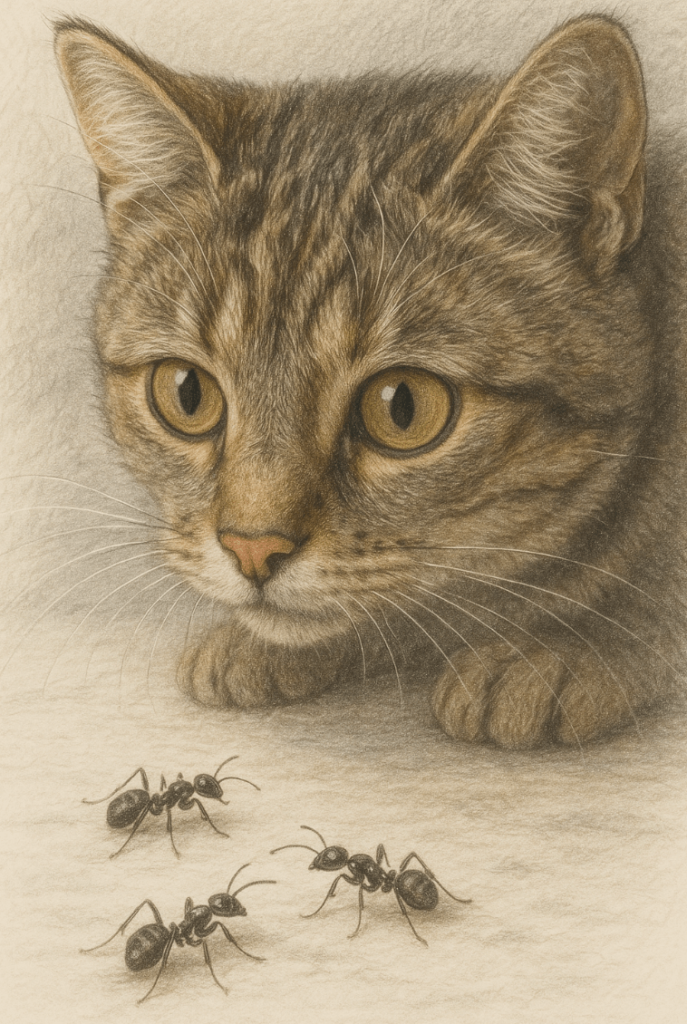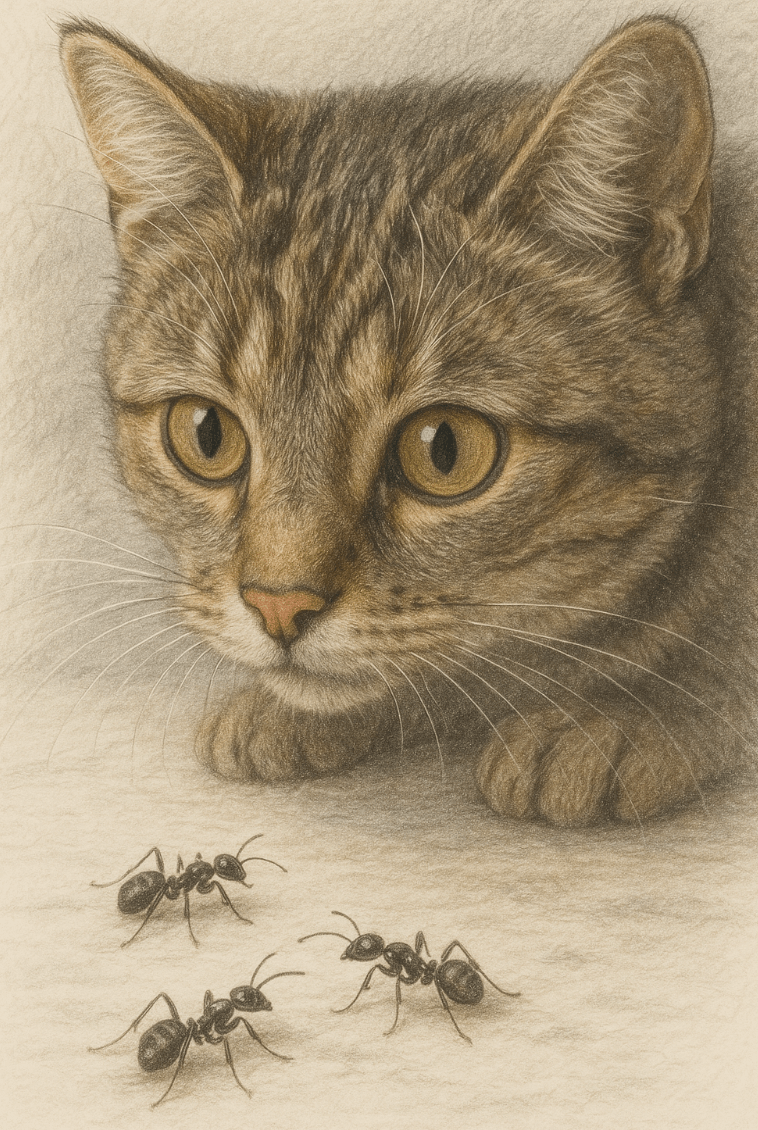Can Cats Eat Ants? What You Need to Know
Cats are curious creatures, and their natural instincts often lead them to explore the world with their mouths. Whether they’re chasing bugs in the backyard or investigating tiny critters indoors, it’s not uncommon for cats to nibble on things they shouldn’t. One question that frequently arises among cat owners is whether cats can eat ants. While ants may seem harmless, there are important factors to consider before letting your feline friend indulge in this peculiar snack. In this blog post, we’ll explore the potential risks and benefits of cats eating ants, what types of ants to watch out for, and how to keep your pet safe while satisfying their curiosity.
Potential Risks of Cats Eating Ants
While ants might seem like a harmless snack, they can pose certain risks to your cat depending on the species and circumstances. Here are some potential dangers to be aware of:
Toxic Species of Ants:
Certain ants, such as fire ants or carpenter ants, can deliver painful bites or stings that may irritate your cat’s mouth or digestive system.Chemical Exposure:
If ants have been exposed to pesticides or insecticides, ingesting them could expose your cat to harmful chemicals.Allergic Reactions:
Some cats may have allergic reactions to ant bites or stings, leading to swelling, itching, or difficulty breathing.Digestive Upset:
Consuming large quantities of ants, even non-toxic ones, can cause vomiting, diarrhea, or stomach discomfort in cats.Choking Hazard:
Although rare, small ants could potentially become lodged in your cat’s throat if swallowed in large numbers.
Understanding these risks helps ensure you take the necessary precautions to protect your cat from harm.
Are There Any Benefits to Cats Eating Ants?
While the idea of cats eating ants might raise concerns, there are a few potential benefits if done safely and in moderation. However, these advantages should be weighed carefully against the risks.
Natural Protein Source:
Ants contain protein, which is an essential nutrient for cats, though the amount provided by eating ants is negligible compared to their regular diet.Mimicking Hunting Behavior:
Chasing and eating ants can fulfill your cat’s instinctual need to hunt and play, providing mental stimulation.Low-Calorie Snack:
For cats who enjoy snacking, ants are unlikely to contribute to weight gain due to their minimal calorie content.Dental Health Stimulation:
Crunching on small insects may help clean your cat’s teeth slightly, though it’s no substitute for proper dental care.Curiosity Satisfaction:
Allowing supervised exploration of harmless ants can satisfy your cat’s curiosity without significant risk.
While these benefits exist, they don’t outweigh the importance of ensuring your cat’s safety when interacting with ants.
Check this guide 👉Can Cats Eat Ketchup? Best 7 Expert Tips!
Check this guide 👉Can Cats Eat Arugula? Best 7 Expert Tips!
Check this guide 👉Can Cats Eat Edamame? Best 7 Expert Tips!

Safe Practices Around Ants | Risks to Watch Out For |
|---|---|
Supervise outdoor playtime | Fire ants delivering painful stings |
Keep indoor spaces free of pesticide use | Chemical exposure from treated ants |
Allow occasional harmless ant encounters | Allergic reactions to ant bites or stings |
Provide alternative toys for hunting fun | Digestive upset from consuming too many ants |
Consult a vet if unusual symptoms occur | Choking hazards from swallowing large groups |
How to Prevent Your Cat from Eating Harmful Ants
If you’re concerned about your cat’s fascination with ants, there are several steps you can take to minimize risks and redirect their behavior.
Inspect Outdoor Spaces:
Regularly check your yard for ant colonies or nests and remove them safely using pet-friendly methods.Use Natural Pest Control:
Opt for non-toxic pest control solutions indoors and outdoors to avoid exposing ants (and your cat) to harmful chemicals.Provide Engaging Toys:
Offer interactive toys or puzzles that mimic hunting activities, reducing your cat’s interest in real insects.Supervise Outdoor Adventures:
Keep a close eye on your cat during outdoor playtime to prevent them from munching on unknown bugs.Teach Redirected Behaviors:
Train your cat to focus on other activities, such as chasing a feather wand or laser pointer, instead of ants.
Taking these proactive measures ensures your cat stays entertained and safe while exploring their environment.
Signs Your Cat May Have Eaten Harmful Ants
If your cat has eaten ants, especially toxic species or those exposed to chemicals, it’s important to monitor them closely for signs of distress. Here’s what to look for:
Excessive Drooling:
Drooling can indicate irritation in your cat’s mouth caused by ant bites or stings.Vomiting or Diarrhea:
These symptoms suggest digestive upset from consuming too many ants or ingesting harmful substances.Swelling or Redness:
Swollen lips, gums, or paws may signal an allergic reaction to ant bites or toxins.Lethargy or Weakness:
A sudden lack of energy could indicate poisoning or severe discomfort.Difficulty Breathing:
Labored breathing requires immediate veterinary attention, as it could signify a serious allergic reaction.
Recognizing these signs early allows you to seek prompt treatment and prevent complications.
Common Misconceptions About Cats Eating Ants
There are several myths surrounding cats and their interactions with ants. Clarifying these misconceptions helps set realistic expectations for pet owners.
All Ants Are Safe for Cats:
Not true—some species, like fire ants, can deliver painful stings or cause allergic reactions.Eating Ants Provides Nutritional Value:
While ants contain protein, the amount is negligible and doesn’t replace a balanced diet for cats.Ants Can’t Harm My Indoor Cat:
Even indoor cats can encounter ants exposed to household chemicals or pesticides.My Cat Won’t Be Interested in Ants:
Many cats are naturally drawn to small moving objects, including ants, regardless of breed or personality.I Don’t Need to Supervise My Cat Outdoors:
Unsupervised outdoor time increases the risk of exposure to harmful insects or chemicals.
Dispelling these myths ensures a deeper understanding of your cat’s behavior and safety needs.
Alternative Ways to Satisfy Your Cat’s Hunting Instinct
If your cat enjoys chasing ants, there are safer ways to channel their hunting instincts without relying on real insects.
Interactive Toys:
Feather wands, laser pointers, and plush mice mimic prey movements and keep your cat entertained.Puzzle Feeders:
Food-dispensing toys challenge your cat mentally and physically, simulating the thrill of “hunting” for treats.Catnip-Infused Toys:
Toys infused with catnip encourage active play and satisfy your cat’s urge to pounce and chase.Window Perches for Bird Watching:
Installing a perch near a window lets your cat observe birds and insects safely from indoors.Rotating Play Sessions:
Introduce new toys regularly to keep your cat engaged and reduce boredom-related behaviors.
These alternatives provide safe and stimulating ways for your cat to express their natural instincts.
Tips for Managing Ant Infestations Safely Around Cats
Dealing with ants in your home requires caution to protect your pets from accidental exposure to harmful substances.
Use Natural Deterrents:
Sprinkle cinnamon, vinegar, or citrus peels around areas where ants enter—these are safe for cats and repel insects.Seal Entry Points:
Block cracks and crevices with caulk or weather stripping to prevent ants from entering your home.Clean Thoroughly:
Wipe down surfaces and remove food crumbs to eliminate attractants for ants.Avoid Toxic Baits:
Never use ant baits or traps containing chemicals that could poison your cat if ingested.Consult a Pest Professional:
If infestations persist, hire a pest control expert who specializes in pet-safe treatments.
By following these tips, you can maintain a pest-free environment without compromising your cat’s well-being.
Frequently Asked Questions About Cats and Ants
Is it safe for my cat to eat ants?
Generally, eating a few harmless ants won’t harm your cat, but toxic species or chemically treated ants can pose risks.
What should I do if my cat eats fire ants?
Monitor for symptoms like drooling or swelling, and contact your vet if you notice any adverse reactions.
Can ants carry diseases that affect cats?
While rare, ants can carry bacteria or parasites that might cause mild infections if ingested in large quantities.
How can I stop my cat from eating ants?
Use deterrents like natural pest control, supervise outdoor time, and provide engaging alternatives for hunting behavior.
Should I worry if my cat plays with ants?
Playing is usually fine, but intervene if your cat starts eating ants or shows signs of distress afterward.
Balancing Curiosity and Safety for Your Cat
Cats are naturally curious animals, and their fascination with ants is just one example of their playful and inquisitive nature. While eating a few harmless ants is unlikely to cause harm, it’s crucial to remain vigilant about potential risks, especially from toxic species or chemically treated insects. By taking preventive measures, supervising your cat’s activities, and seeking veterinary advice when needed, you can ensure their safety while allowing them to explore the world around them. Remember, a happy and healthy cat is one whose curiosity is nurtured responsibly.
Do Cats Have Taste Buds? Best 7 Expert Tips! – Discover how cats experience flavors and why their taste is so unique.
Do Dogs Have Taste Buds? Best 7 Expert Tips! – Discover how dogs experience taste, their preferences, and what it means for their diet and health.
Can Cats Taste Sweet? Best 7 Expert Tips! – Discover why cats can’t taste sweetness, how it affects their diet, and tips to keep them healthy and happy.
Can Dogs Taste Sweet? Best 7 Expert Tips! – Discover how dogs perceive sweetness, which foods are safe, and tips to manage their sweet cravings responsibly.





